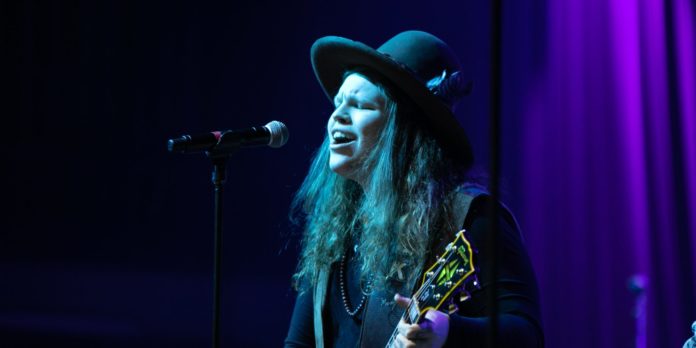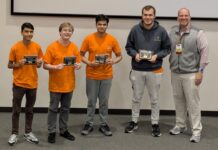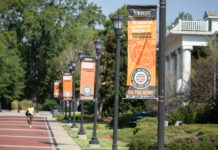On the 50th anniversary of its opening, Capricorn Sound Studios was reborn as Mercer Music at Capricorn.
Hundreds of supporters, including musicians, donors and fans, came together Dec. 2-3 to celebrate the grand reopening of the studio that produced the music of legends such as the Allman Brothers Band, the Marshall Tucker Band, the Charlie Daniels Band, Wet Willie, Elvin Bishop and many others. The two days of events featured a VIP party, dedication and open house, and a sold-out Capricorn Revival concert.
Capricorn Sound Studios ushered in a new style of music, defining the Southern rock sound of the 1970s. Now Mercer Music at Capricorn will use that rich legacy to continue the tradition of fostering new talent while honoring those who came before.
“There will be no place quite like the Capricorn complex — no place in the world quite like it for developing talented young musicians,” Mercer University President William D. Underwood said during the Dec. 3 dedication.
The 20,000-square-foot complex features a music incubator where musicians can rehearse, collaborate and grow; state-of-the-art commercial studios and production rooms for recording; a museum that tells that Capricorn story through digital, visual and audio storytelling; and offices, co-working space and meeting rooms for nonprofits and creatives.
Back from ‘certain destruction’
The opening has been a long time coming.
The building, located at 530 Martin Luther King Jr. Blvd., is actually four historic structures that were assembled into one complex. It was purchased in 1967 by Redwal Music, a company founded by Mercer graduate Phil Walden, his brother Alan Walden, and soul singer Otis Redding, whose career was beginning to take off. Redding’s sudden death in a plane crash delayed the studio’s opening until 1969, when Capricorn Records and the Allman Brothers Band were established in Macon.
The building sat vacant and in disrepair after Capricorn’s collapse in the ‘80s. At one point, it was named one of Georgia’s most endangered historic buildings.

Then, in 2015 Mercer announced a partnership with NewTown Macon, Sierra Development and SPP Commercial to bring the historic building back to life as part of the largest market-rate residential development in the history of downtown Macon. With the recent grand reopening, that vision is becoming a reality.
“This place has come back from what we thought was certain destruction. It was gonna either be a parking lot or torn down and made into offices or something,” said Chuck Leavell, a former member of the Allman Brothers Band and current Rolling Stones music director, as he stood in the control room of the historic Studio A. “And it’s just a miracle that we can walk in here and see that it’s the same that it was in the ’70s when I first came here.”
While most of the complex underwent major renovations, Studio A looks mostly the same as it did in the 1970s. The walls are covered in maroon burlap and wood shakes cover the lights. A groovy curtain in the control room — which houses a cutting-edge, custom-built API 40-channel 2448 Series console — was cleaned and rehung.
While Leavell could see himself returning to Capricorn for certain projects, “more than anything,” he said, “I would like to see young people coming in here and making records.”
A place for musicians to grow
Wet Willie lead singer Jimmy Hall recalled the mentorship he received at Capricorn when he was a young musician.
“When we first got here and hung out with the Allman Brothers, they were very helpful,” Hall said from a room at the Macon City Auditorium, where Leavell led a Capricorn Revival rehearsal. “They mentored us in a lot of ways and would give a helping hand, just like, ‘Come on, we’ll show you how we did it. Maybe what we did can work for you,’ …
“Our little band in Mobile, Alabama, had gotten as far as we could go in that town, on that level. And the Allmans and Capricorn were like a beacon to us.”
If not for Capricorn, “I wouldn’t be here right now. I wouldn’t have the success that I’ve had,” Hall said.
“There will be no place quite like the Capricorn complex — no place in the world quite like it for developing talented young musicians.”
Hall was just one of the artists from Capricorn’s past to perform in the Capricorn Revival concert, which also featured John Bell, lead singer and guitarist of former Capricorn recording band Widespread Panic; Grammy Award-winning blues musician Taj Mahal; Allman Brothers Band founding member and drummer Jaimoe; and former Capricorn recording artist Bonnie Bramlett.
Performing aside these legends were up-and-comers, including Grammy-nominated country singer-songwriter Brent Cobb; Duane Betts, son of former Allman Brothers Band member Dickey Betts; Berry Oakley Jr., son of late Allman Brothers Band bassist Berry Oakley; and Marcus King, a 23-year-old guitar phenom and band leader from Greenville, South Carolina.
King grew up on Capricorn music.
“I don’t think it was a concerted effort in my household to have all the Capricorn catalog, but we came very close, between Delaney & Bonnie and Wet Willie and the Allman Brothers,” King said. “Macon, Georgia, sounds were always in the household.”
The Capricorn sound has influenced King’s own music, which he hopes to record at Capricorn in the future.
“It’s just a subconscious thing,” he said. “You know you always pull from the place that was most sincere to you and spoke to you the strongest. …
“Music can bring you back to a memory or a place in time, and that’s what’s so special about it. And that’s kind of like what we’re doing here this week, bringing people back to a memory they may have had.”
A living history
Even for people who don’t know the music that came out the historic studio, Capricorn can be a place that teaches that.

“It’s important for us to preserve the past in a way that we can move forward, as a way to understand where we came from and move into the future,” said Amantha Walden, daughter of Capricorn co-founder Phil Walden. Having Capricorn “as a learning resource and as a place where bands can also produce music I think is just such a powerful thing for the South and for this town.”
Mercer Music at Capricorn officially opens to the public on Jan. 2. At that time, visitors can browse the museum, tour the studio and begin making music within those walls once again.
“When you visit the Capricorn Museum, you’ll see on the second floor a wall that includes the complete Capricorn anthology,” Underwood said during the dedication. “You’ll also see a blank wall. It’s blank today, but our prayer is that this place will inspire other great music by great artists in the years ahead — music that future generations will find inspiring and will want to be memorialized in this place on that wall.
“We want the history of Capricorn to be an ongoing, living history.”










